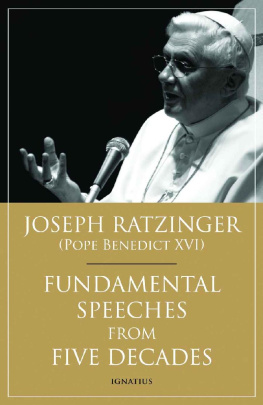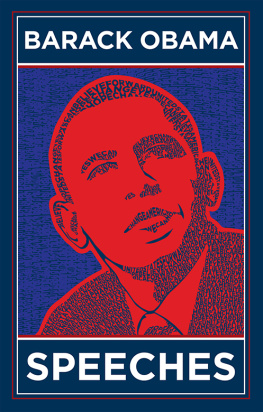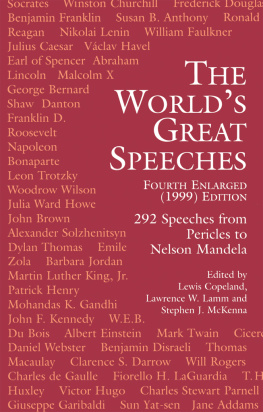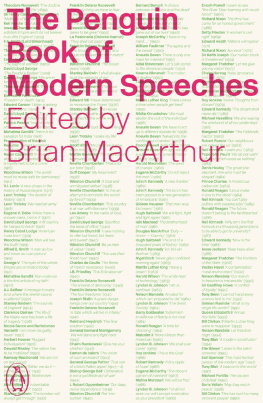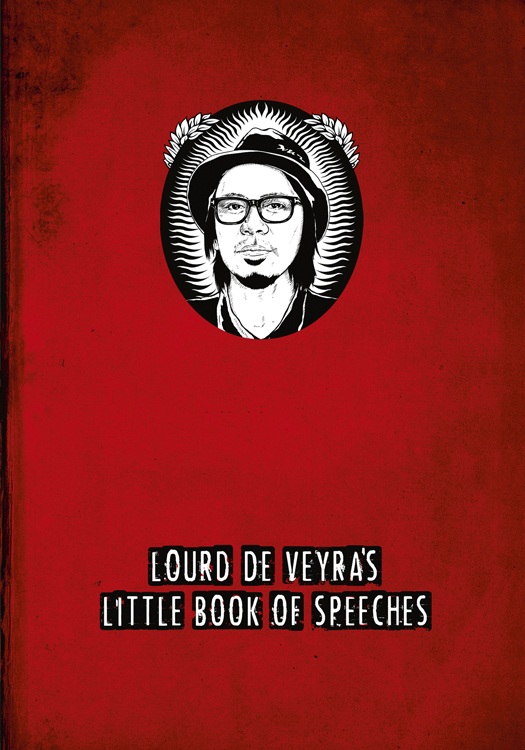
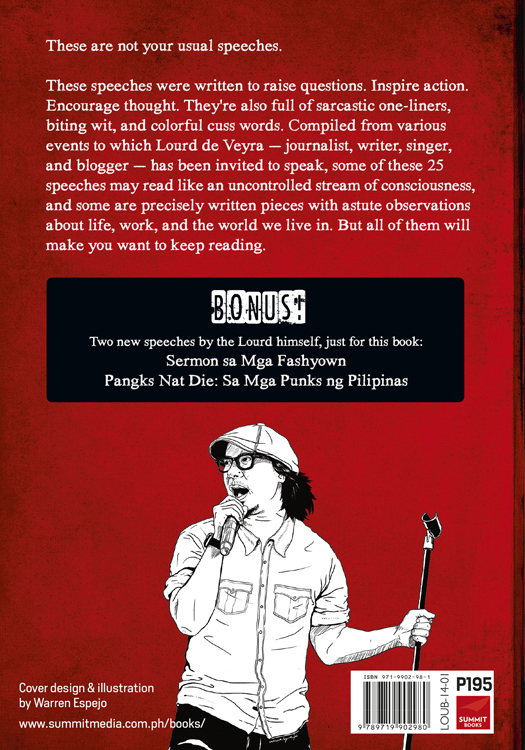

The opinions expressed in this book are those of the author only and do not necessarily reflect the views of Summit Media.
Summit Books is published by
Summit Media
6F & 7F Robinsons Cybergate 3
Pioneer Street
Mandaluyong City 1550
Philippines
www.summitmedia.com.ph
Copyright 2014 by Lourd Ernest H. de Veyra

All rights reserved. No part of this book may be reproduced in any form or by any electronic or mechanical means including information storage and retrieval systems without permission in writing from the publisher, except by a reviewer, who may quote brief passages in a review.




Lourd de Veyras
Little Book of Speeches
Joanna C. Manalastas
Editor
Warren Espejo
Art Director and Illustrator
Aya Tantiangco
Managing Editor
Summit Media
Lisa Gokongwei Cheng
President
Edna Belleza
Publisher
Christine Ko
Deputy Group Publisher
Maria Gabriella Umali
Publishing Assistant for Books
Mavreen Yapchiongo
Managing Editor for Books
Intet Victoriano
Jr. Production Director
Dina Jesuitas
Production Coordinator
MUG SHOT: An introduction
Mug ang kadalasang binibigay ng mga nag-iimbita. Di ko alam kung meron ba sa mukha ko na nagbibigay ng indikasyon na umiinom lang ako mula sa hiniwang bao ng niyog. Punong- puno na ng mug ang kusina kona may mga logo ng mga kumpanya at eskwelahan.
Mug, saka certificate of appreciation. Kadalasan, ikaw pa ang magpapa-frame. Pag sinuwerte ka, mali pa ang spelling ng pangalan mo. Kung hindi Lord sa first name, De Vera ang apelyido. Pag sinusuwerte, may pang-gas, kaso for deposit.
Matrabaho para sa akin ang pagbibigay ng speech. Una at pinakamalaking problema, ang pagsusulat. Hindi gaya ni Gang Badoy, hindi ako magaling sa extemporaneous na talumpati. Ninenerbyos ako, nagiging kalat-kalat ang train of thought. Bilib ako sa mga taong kayang magsalita nang tuloy-tuloy sa harap ng malaking audience na walang Aaaahhhh or Uhhhhmmm. Kaya kailangan kong magsulat, at bukod pa dun, kailangan ko ring mag-research depende sa paksa. Para di ka naman mukhang tanga, di ba? Ayaw mo rin yung mga sasabihin mo ay parang sa mga messages sa souvenir program ng government agency (Warmest greetings.).
In short, pagsusulat pa rin. Ang problema, hanggang ngayon, hindi pa rin sa akin madali ang pagsusulat. Effort pa rin. Kailangan mo pa ring umupo, mag-isip, humanap ng mga reference, mga quote sa mga libro (hindi Google!), at, kung minsan, magpuyat at uminom ng kape sa isa na namang bagong mug.
Isang parte lang yun. Mas kumplikado yung susunod: yung audience. Hindi ako sanay humarap sa tao. Pero nagbabanda ka naman, di ba? may hihirit. Iba yunkasi marami kang kasama sa stage at maingay kayo. Bukod pa dun, may alak kami sa tabi ng stage.
Ewan ko ba kung bakit hanggang ngayon, marami pa ring nag-iimbita. Kala yata nila may mapupulot silang aral sa kin. Baka wala, kaya mug lang siguro ang katapat.
Kaya heto ang libro. Inipon ko ang mga speech. Para kahit papaano, medyo makabawi naman sa lahat ng pagod, puyat, at stress. Mapapansin ng mambabasa na may ilang mga bahagi o punto na parang umulit-ulit lang. Ganun talaga. Oo, minsan pine-plagiarize ko na lang ang sarili ko. Nakakatamad eh.
Gusto mo ng mug?
Lourd de Veyra 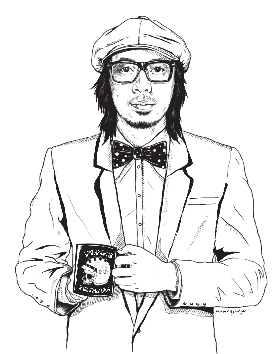

THE POET OF NOW
(A very pretentious manifesto of sorts)
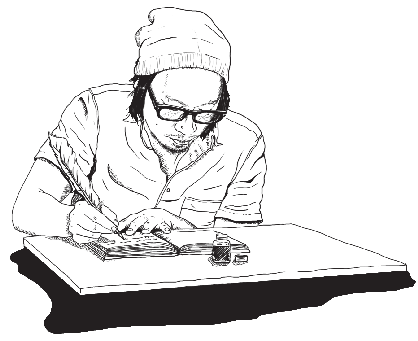
Presented at the UST National Writers Workshop in Baguio, about the same time Erap loyalists were wreaking havoc throughout the city. Baguio in the summertime is pleasant, at times, surprisingly cold, and I had no idea what I was talking about. But then again, we were in Baguio. And there was excellent, uh, salad.

The poet of now should inflict acts of graceful violence on the language.
The poet of now knows the rules before he breaks them. And he knows why he is breaking the rules.
He breaks them so that the same rules may live on. So that art can survive, and that newer rules would soon emerge.
The poet of now does not trap himself in the padded basement of academic pedantry, although he is aware that he cannot exist totally outside it. He is aware of its limited breathing space.
He understands that he has other readers who do not live in that basement, and that his art needs to thrive beyond its parameters.
The poet of now does not reject but flows harmoniously with his societyno matter how confusing or banal it may be. It is the nature of existence.
It is because he knows it is the only world for him. He embraces this world. To escape is futile.
The poet of now is faced with the responsibility of reflecting his cultureand he is cognizant of the fact that it is not the culture of New York, Iowa, Oxford, Scotland, Japan, Moscow, Colombia, Chile, or Nigeria. But he is also faced with the question: what the hell is my culture?
His imagination thrives in a playground where Lapu-Lapu dances with the Teletubbies, where ancient Sufi sayings collide with hipster jive, where Shakespeare, Lao Tzu, Siddharta Gautama, Plato, Schopenhauer, Marx, Kant, Descartes, Krishnamurti, Rumi, Rilke, Dali, and Irvine Welsh play poker with Jose Rizal, Andres Bonifacio, Emilio Jacinto, Juan Luna, Macario Sakay, Valentin delos Santos, the Juan dela Cruz Band, Gary Granada, Joey Ayala, Jose Maceda, Lucrecia Kasilag, and Teodoro Agoncillo. He knows all these because he has no excuse: the technology of now enables him to access information at the click of a button.
The poet of now has ears that are constantly openhe appreciates the rhythmic cacophony of the jeeps in Quiapo, the buses festering in the Cubao-EDSA intersection, the pedicabs of Malabon, the bancas of Navotas.
His auditory imagination stretches all the way to other parts of the planet. He knows that by tuning in to these sounds he is listening to the rhythm of a universe that is concretely true to him.


